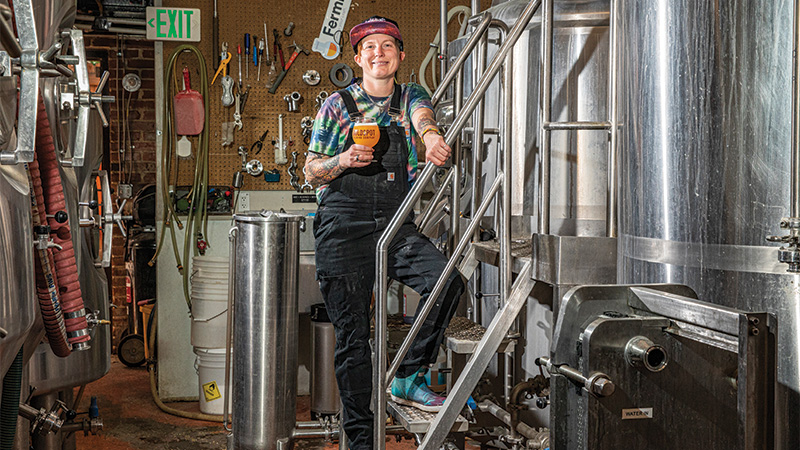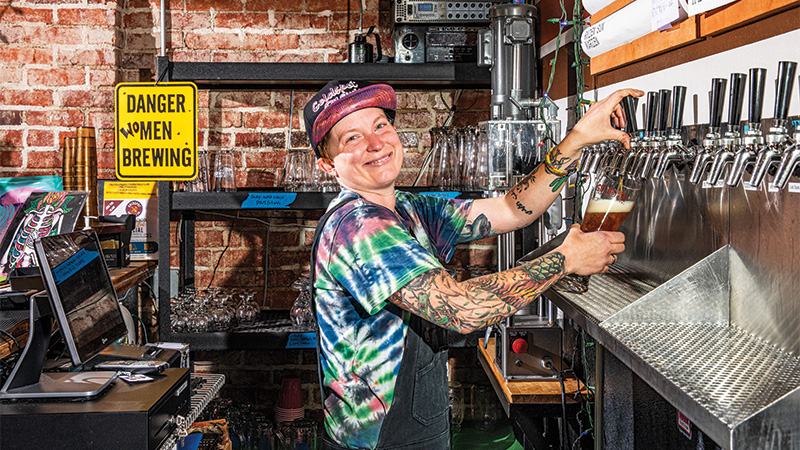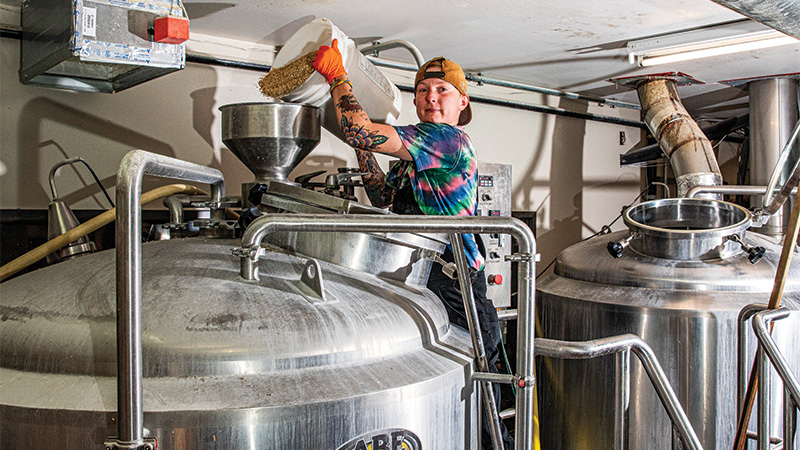Kelissa Hieber got her start in beer at just 21 years old when she decided to experiment with brewing out of her home in Ohio. With years of professional experience in community organization, Hieber took up homebrewing as a hobby, but it wasn’t long before she realized she wanted it to become her career. So, she packed her bags and moved to Colorado, where there were more opportunities for not only brewers, but for people in the LGBTQ+ community. Today, Hieber is the head brewer and sole owner of Denver’s Goldspot Brewing, which she operates on the foundational belief that creating a good community is what a brewery is all about.
After completing an internship at heavy metal TRVE Brewing, Hieber joined the team at the newly opened Goldspot in August 2015 as a bartender and one of the brewery’s first employees. She soon took on the apprentice role of assistant brewer and just a few months later became Goldspot’s head brewer, diving head first into formulating new recipes and learning everything possible about brewing, despite not having many funds to do so.
Don’t Miss A Drop
Get the latest in beer, wine, and cocktail culture sent straight to your inbox.

“I had a couple of really great mentors that would just come in and tell me if my beer totally sucked,” she explains. “But they would also tell me why it sucked and how to make it better. That sort of stuff was super important to me.”
As head brewer, Hieber is committed to providing Goldspot’s guests with an eclectic drinking experience, rotating beers as often as once a week to experiment with a number of different flavor profiles. She thinks of herself as a “chef-y” brewer, envisioning a specific flavor profile and working tirelessly to perfect the ingredient list, proportions, and aging methods. For one of her favorite Goldspot brews, the Oso Zesty, she tinkered around with limes from all over the globe before deciding that Persian lime was the perfect pick for the Mexican lager to make the flavor profile “just different enough.”
“I had done a Sudachi lime lager. It can be very heavy on white pepper umami, it’s not very consistent, and it’s very expensive,” she explains of her recipe and development process. “It’s still great internally, but when I tried to sell it to distribution, it was too weird for some people. So I thought, all right, let’s find something else that’s unique enough, but is more affordable and consistent.”

In addition to coming up with beers like Oso Zesty, Hieber also cooks up mezcal-inspired cocktail beers like the Unity Bell, IPAs bursting with tropical fruit juices, and even a gluten-reduced brew for those with intolerances. In her role, she’s experimented with wine- and spirit-barrel aging in collaboration with Laws Whiskey House; mimicked popular cocktails in her beers; and collaborated with dozens of other breweries. To date, she estimates that she’s created over 300 recipes.
In 2018 when Goldspot’s founders and former owners, brothers-in-law Matt Hughes and Alex Sward, made the decision to sell, Hieber, alongside Winnie and Ryan DuBois, assumed ownership of the brewery, with Hieber remaining head brewer. By February 2021, she was sole owner and head brewer, and on a mission to make her space as inclusive and community-driven as possible, with special focus paid to intersectionality between LGBTQ+, BIPOC, and women communities.
“I wanted to hire and support as many queer people as possible in every way, shape, and form,” she says while reflecting on her first year as sole owner. In the past, Hieber has organized projects benefiting the Transgender Center of the Rockies and the Transformative Freedom Fund, two nonprofits seeking to provide gender-affirming care and remove barriers to health care for transgender individuals, respectively. Goldspot Brewing also serves as the bi-monthly meeting place for Homos & Homies, a pop-up featuring queer and BIPOC food vendors and artists.

Hieber also had a hand in organizing Goldspot’s ongoing partnership with Frontline Farming, a BIPOC and women-owned food justice organization. Most recently, the two have kickstarted the Farm to Fermentation project, which will include a rotating selection of beers made throughout the year from fresh ingredients grown on the farm, with a portion of each can and draft sale benefiting Frontline Farm itself.
“The first year we went so heavy in queer stuff, and that’s great, but intersectionality is my favorite thing in the world, especially as the world has continued to fall apart through social justice and trans rights and immigration rights,” she explains. “They are increasingly becoming more of the things we need to be prioritizing.”
For Hieber, owning a brewery is more than just producing great beer and having a place for people to come and drink it, despite the immense cost it can take to do so. “We do those things, too,” she says. “But that actual community, what you get when you see people happy and actually hanging out at a brewery? That’s what makes having to pay never-ending increases in sales tax a little less gut-wrenching.”


